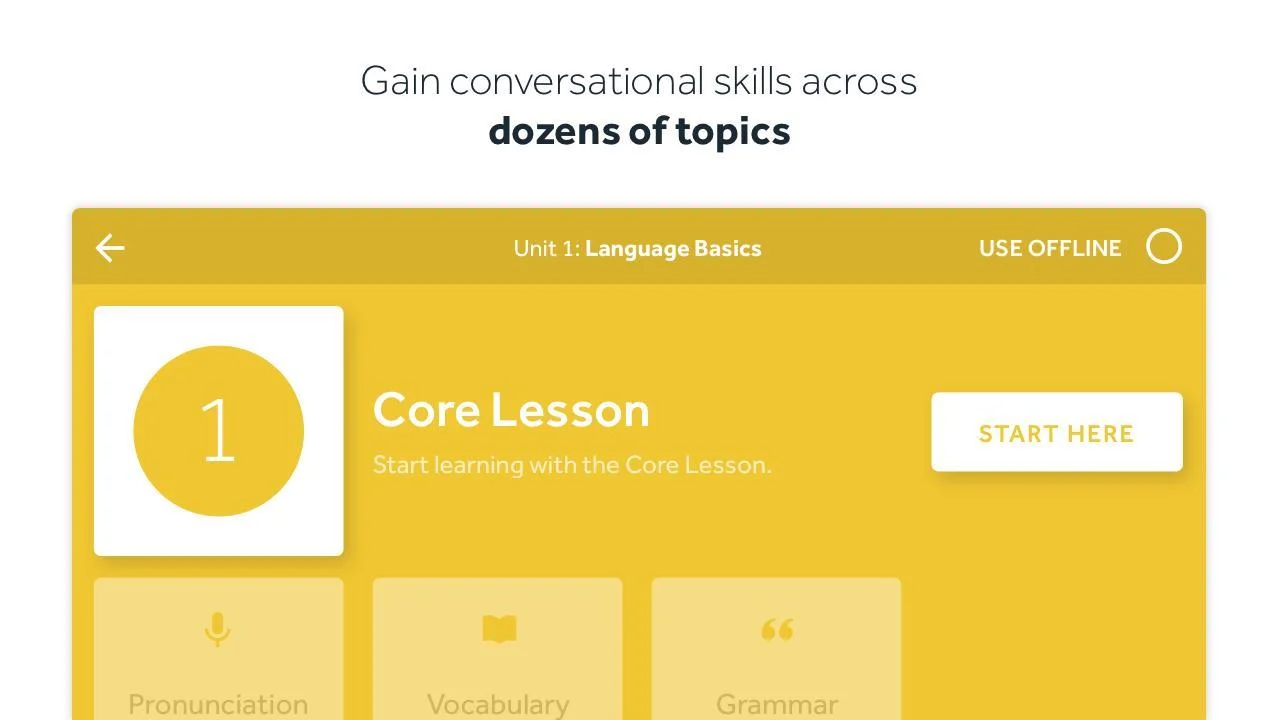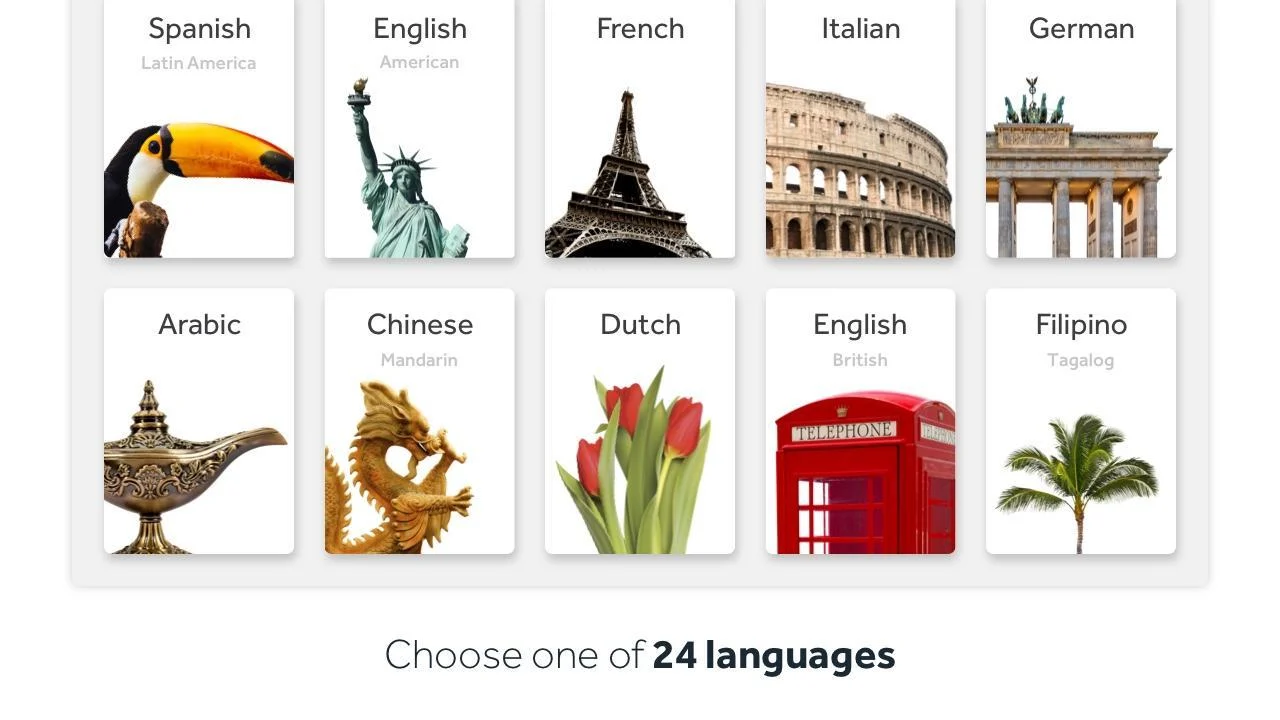The Animo Fanz (or Anime Fanztube) app lets you watch new episodes of your Anime on the phone from the comfort of your home. This apk is best used with a cellphone.
You can watch thousands of anime videos. Animo Fanz lets us watch Anime shows and other Anime on our Android devices. The app can allow us to watch Anime online and in good quality.
It also has a simple-to-use interface, and the apk is 13MB. If you are an anime lover, this app is for you.
Features of Animo Fanz
- Popular Anime App.
- Watch Your Favorite Anime Videos for free.
- Lots of Anime Series.
- Simple Design.
- Search engine.
- SD, HD & FHD seamless streaming
- Find out the latest Anime and trending Anime
- Mark your Anime as favorites to come back ANY TIME
- 100% free to use
- Search anime.
- Continue the last episode.
- Autoplay next episode.
- Support for English languages.
- Cast episodes for TV
- Anime movies
- can download offline watching
Design
The Animo Fanz app is easy to use and easy to navigate. You can customize the app to your own liking.
Database
You can enjoy more than 5000 Anime Shows and Movies updated daily, including Spy x family, Detective Conan, Doraemon, and Ghibli Anime.
Release
Never miss your favorite show, and be the first to watch the released episodes.
Servers
Animo Fanz has multiple streaming servers and streams from 320p to 1080p.
Bookmark
Add series to your Watchlist and favorites, and check your history to continue from where you left off.
With modapkqueen blogger, you can have your favorite anime on your hands.
Animo fanz
Rosetta Stone is an English language learning software and the world's first international language learning software. The device is applied to today's most advanced recording and voice recognition technology.
Rosetta Stone is one of the best language-learning software out there. The number of languages in Rosetta Stone is also very diverse, with the 12 most popular worldwide. With more than two million learners worldwide, Rosetta Stone is the leading language learning software approved by prestigious organizations such as NASA and the US Department of State.
General information
Rosetta Stone is software that supports computer language learning. Those who have difficulty learning a new language, for whatever reason, will find success with Rosetta Stone.
The program uses images, text, audio and video to help users memorize vocabulary and grammar most easily. This spaced repetition method is what Rosetta Stone calls the “Dynamic Immersion” method. It allows learners to think and develop sentences in the newly learned language.
For languages that do not have the Latin alphabet, the program has an on-screen virtual keyboard to enter characters when doing exercises. Users can practice speaking skills by speaking into the microphone for the program to test pronunciation.
After each lesson, Rosetta Stone will review the content and have a virtual dialogue with the learned information inserted. You can also measure your progress, the number of questions skipped, the number of correct answers and the percentage of correct answers in the lesson.
This is the fastest and easiest way to see progress in your learning and determine which skills need further improvement. With Rosetta Stone, you will learn an innovative and breakthrough foreign language learning method that no other class has.
What technology does Rosetta Stone software use?
Rosetta Stone is the first international language learning program to apply differential technology. The most advanced speech analyzer available today is the American Speech Recognition Engine.
This technology allows learners to practice speaking directly with software based on elaborately built communication with vivid images and sounds. The software will detect all errors in pronunciation and semantics, helping learners' ability to communicate in foreign languages improve significantly.
Core lesson
When you start to get acquainted, you will come to the concept of Core Lessons – the lesson's core. This part is quite long. If you study well, you will have a good foundation later.
One main lesson consists of 33 exercises with clear pictures. This section has no videos or subtitles, helping you practice listening and pronunciation effectively. The unique feature here is that Rosetta Stone integrates voice recognition.
It will automatically move on to the next part if you pronounce it correctly. If you mispronounce, try several times again. That's why this software helps you practice listening and pronunciation well.
Each lesson, passing five Core Lessons, equates to 100 Key Lessons for the complete process. The number of core lessons will gradually increase towards the end for you to synthesize your knowledge.
Rosetta Stone listening
At Rosetta Stone, you mainly practice listening skills through images. Listening is usually wholly predictable. Rosetta Stone's clear, easy-to-hear sound helps determine the allowable stress and sentence.
You can also listen to it repeatedly by clicking the green button in the software. You can listen to the dialogue and choose the picture you think is correct, not necessarily understanding the whole sentence.
Rosetta Stone speaking
With Rosetta Stone Speaking, you will hear a phrase first. And then you will have to repeat what you heard. It will be helpful to have an audio microphone ready when participating in Rosetta Stone Speaking.
If you pronounce it correctly, the software will confirm and approve it. As said above, if you pronounce it wrong, try again. Sometimes it takes up to 20 times to get a sentence.
Rosetta Stone will give you a text. You must read and understand what it says and choose the corresponding image. Easy. Besides reading, you can click the Listen button in this section to see how people pronounce it.
Rosetta Stone writing
This part gets the most people in trouble. Use the virtual keyboard; if you freeze the computer, it will be very time-consuming. That is a big minus point of Rosetta Stone. In general, listen attentively, then type answers into the machine. Despite all these hassles, it's also a way to test your persistence.
Rosetta Stone Grammar
Rosetta Stone emphasizes what they want you to notice by highlighting colour in basic grammatical structures. And if you practice a lot, your grammar will improve quickly.
Rosetta Stone Vocabulary
In this section, you listen, read the text, and select images simultaneously. Rosetta Stone Vocabulary does not teach single words, so you will review a lot of vocabulary in one lesson.
Have fun learning!
Rosetta Stone apk mod
Oxford advanced learner's dictionary: How to use
You can access this dictionary directly at: https://www.oxfordlearnersdictionaries.com/
Single word
Here is the main interface of the Oxford Learners' Dictionary:

To start, tap the search bar and type the word you want to look up. While ordering, the dictionary will automatically suggest the closest words, saving you time searching for long terms.
Here are some of the most basic details of the word:
1. Word type: Tells you the type of word: noun (noun), adjective, (adjective), verb (verb), adverb (adverb), preposition...
2. Transliteration of words: helps you to know how to read correctly. There are 2 pronunciations here - corresponding to 2 English and American readings.
· The line above with the blue speaker symbol represents British English (BrE): British pronunciation
· The line below with a pink speaker icon represents American English (AmE) or North American English (NAmE): the pronunciation of Americans (mainly in North America, such as the US and Canada...)
See pronunciation of past forms + 3rd person singular of verbs
Particularly for the word to look up, we can check the different forms of the verb conjugation in the present tense, past tense, etc., when selecting the button. "Verb forms".

Corresponding to the different forms of the verb, you'll also see the IPA phonetic transcription and hear the pronunciation of British and American accents. Not only will this help you remember the spelling, but it will also help you learn the correct pronunciation of verb forms.
Specifically, you will be able to correctly read verbs ending in "s/es" (3rd person singular in the present) and how to pronounce the ending "ed" (V2 & V3) of irregular verbs like the illustration above.
3. Definition: A word can have many similar or different meanings. After looking up the word, we will see the detailed definitions of the words numbered 1, 2,...
4. Synonyms: For some words, the SYNONYM section will appear as shown in the picture. These words are synonyms and can most often be substituted for the term you just looked up (in this case, we could use "incredible" instead of "amazing").
5. Examples: The most important part is showing examples and word usage. For instance, we can see "amazing" modifiers for nouns, the structure "amazing to do something", "it is amazing that...", "find it amazing",... and specific example sentences.
In addition, there are some points worth noting, such as:
- A word can have many types of words (for example, "level" is a noun, an adjective and a verb). When looking up a word, the dictionary page will only show a single type of word. If you want to look up the meaning of other words, you can look in the right corner to find different words suggested by the system, such as adjectives or verbs.
- Immediately below are often suggested phrasal verbs and idioms related to words for us to learn more

- Below the definition, there are also "Extra examples" (some additional examples) and "Collocations" (some combination words).

To view each item, click on the pink bar, and a detailed information window will appear:
Phrasal verbs
Phrasal verbs are verbs combined with a preposition or an adverb (or both), such as lookup, call off, take in, etc., weaknesses created by native speakers in the process of using the language.
The only way to recognize these words and communicate better is to expose them a lot and remember them.

Look up the phrasal verb "call off" (cancel)
As introduced, with the relatively large vocabulary of the Oxford Learners' Dictionary, you can find most of the primary and common phrasal verbs. With the "call off" example, we see that there are 2 structures: "call somebody/something off" (order someone or order a dog to stop attacking or search...) and "call something off" " (cancel something).

At the same time, when looking up a word, if the word has phrasal verbs, the dictionary will appear right below the word "Phrasal verbs" button as follows:
Clicking on it will take you to a list of phrasal verbs for the word "call". If you want to see a comment, click on it. It's convenient.
Idioms
Idioms are phrases or statements that often have a symbolic, figurative meaning compared to the literal meaning of each word. For example: drop the ball (abandon responsibility), not cut out for (not have the ability or experience to do something), all ears (willing to listen)... Most of these words are usually informal, so you must be careful when using them.
The way to look up words is the same as in the last 2 parts, you need to type in the idiom you want to find, and the system will take you to the correct position of that idiom. For example, when you order "break a leg" (good luck, usually used for people getting on stage), the dictionary will take you to the conversational part of the word "leg":
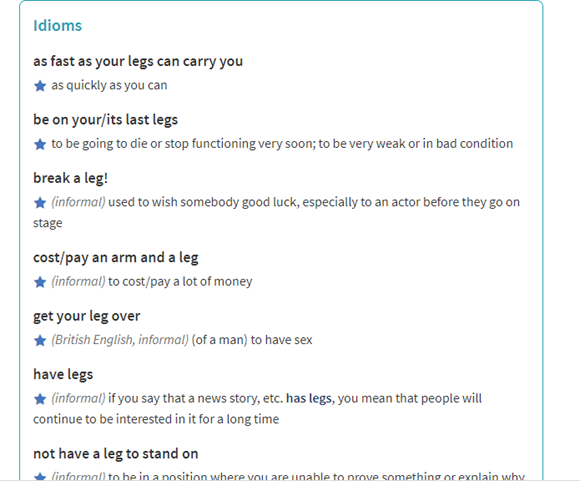
And, of course, when you look up a word, you will also see the "Idiom" button suggested below:

Unfortunately, this section usually won't have examples, so you can refer to more online or develop your own standards.
3. Other properties of the word
In addition to some basic features of words or phrases as above, the Oxford dictionary also provides a lot of related information that is very useful for learning English. These features are often added next to the word or phrase or placed right next to it so that it's easy for learners to find and remember.
Countable and Uncountable (only applies to Nouns)
For nouns, you should note whether the noun is countable or uncountable. Then you can choose appropriate plural forms, and articles can be used.

In this case, the word "research" is an uncountable noun.
Transitive and Intransitive (Verbs only)
You can quickly know that a verb is Transitive - needs to be followed by an object) or Intransitive (does not require an entity to follow).
In this example, with the word "run", we can see that this word has many meanings.
- If "run" means to move quickly on foot (run), it would be an Intransitive.
- If "run" means operating or managing something, it will be a transitive verb (run something).
Position of the adjective
For adjectives, the dictionary will sometimes tell you where it's in the sentence. For example, with the word "willing":
- If "willing" means no objection, it usually comes after the noun (not usually before the noun).
- If "willing" means willing, willing, willing to help or do something, it usually comes before the noun (usually before the noun).
Formal are words used in traditional or written contexts to show respect. You often use these words to communicate with older people, higher-ups or new strangers. Informal are everyday words used to communicate between friends or close acquaintances.
In the image below, the word "assist" is used in the context of "formal" instead of "help". Particularly the word "hey" is an informal greeting between close people or friends, very common, not suitable for writing or used to greet people older than you.

Approving and Disapproving
Approving are words with good, positive meanings. On the contrary, Disapproving shows nasty and negative meanings. In the example below, we see that the word "naive" has both meanings, so we need to be careful when choosing the word.
- "naive" means lack of knowledge, lack of accurate judgment or lack of life experience and easily trusting people -> negative
- "naive" means pure, simple -> positive

Synonym and Opposite (Antonym)
Synonyms are synonyms, and the Opposite are antonyms. Some words may have many synonyms or antonyms. When looking up words, if there are related synonyms and antonyms, the dictionary will suggest us immediately.
The synonym of "ugly" is "unattractive."

The antonym of "right" is "wrong."
4. Some additional features
Word Family
For some words that have other word families or word families (in other words, different expressions of that word), this dictionary page will display the "Word family" button:

As a result, you instantly grasp all the word families by just looking up a word:
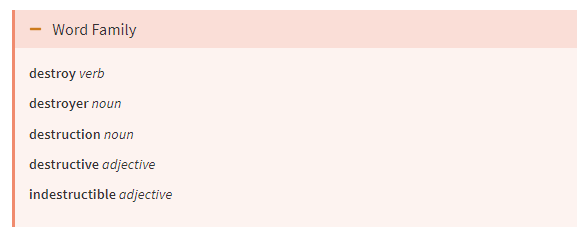
Which words?
This section is a helpful feature that helps you distinguish one word from another. For example, look up the word "although", scroll down and click on "Which words?" Below, we will clearly see how to distinguish.
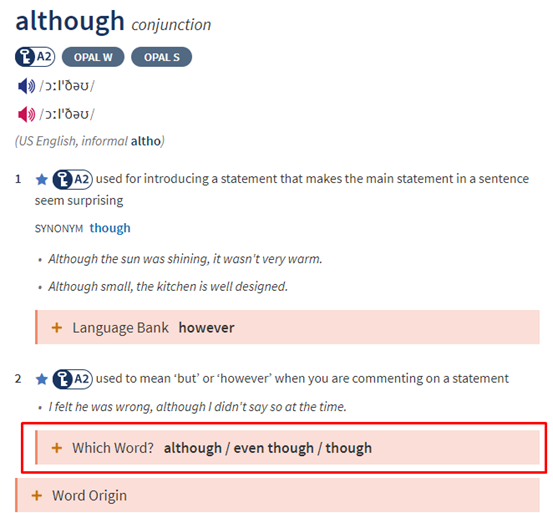
Bar "Which words?" located right below
Inside content: Distinguish although/even though/though
Language bank
The "Language Bank" section will suggest different ways of using words or phrases to express the same meaning. In other words, this is how you use synonyms. Let's also try the term "although":
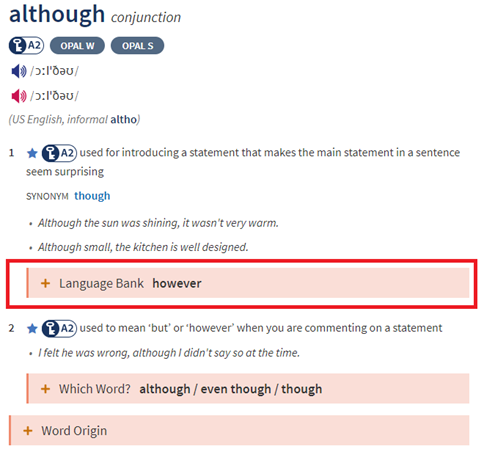
Ways to express "but."
Collocations
Collocations are ways of combining words and expressing words that go together often. For example, to describe the action of riding a bicycle, you would use the phrase “ride a bicycle” or “go for a bicycle ride” but not “run bicycle”. Some other words like: "get pregnant", "go collapse", "do someone a favor", take a seat...
Similar to the previous sections, the "Collocations" section usually appears when related to the word you look up.

In the image below, when looking up the word "child", we will see a table of word combinations. Knowing many collocations shows you have a thorough understanding of English and, at the same time, helps you to use natural words like a native.

Collocations related to "children."
Culture
Reading the name "Culture", you probably also implicitly understand that this section is about the culture closely related to the word searched. For example, when looking up the word "tea" - a popular drink in England, Oxford will give you a little related information like this:

Now we not only learn the language but also absorb exciting information. Therefore, learning a foreign language and drinking a new culture is fine.
Word Origin
Those curious want to learn about word origins or often ask themselves, "Where did this word come from?" Oxford also has a "Word Origin" section for some of its vocabulary.
5. The app version of the Oxford Learners' Dictionary
To help learners look up the Oxford dictionary conveniently on their mobile devices, Oxford Learners' Dictionary supports both iOS and Android mobile app versions.
· the iOS Version
· Android Version
Note: Unlike the website version, the Oxford application is a paid application, so for you to look up words and use the full features of the application, you need to buy a Premium account. With a Premium account, you will get the following:
· Look up the entire vocabulary of the Oxford dictionary. (Currently, the Oxford preview is limited to viewing only 100 available words and does not look up other new words.)
· Use support features such as saving words, pronouncing words, viewing word lookup history, and doing vocabulary tests, ...
But, on the modapkqueen blogpost, you can have free premium Oxford advanced learner's dictionary app for Android. Sounds cool, right?
Download here
You can see some example sentences of words with audio pronunciation in British and American accents so that learners can quickly know the pronunciation of native speakers in sentences. This is a unique feature compared to the regular web version of Oxford.
Oxford application also supports users to add 2 functions in the word lookup interface:
1. Word pronunciation: You can listen and practice the correct pronunciation of the word you hear.
2. Save words to Favorites to review.

Additional features in the lookup interface
In addition, Oxford also supports you with some necessary features in the App's Menu, as shown below:

1. Favorites: Review the list of saved words.
2. History: Review the history of all searched words.
3. Quiz: Answer questions that test your vocabulary.
4. Word of the day: A list of words that Oxford advanced learner's dictionary suggests you learn during the day.
Download here




